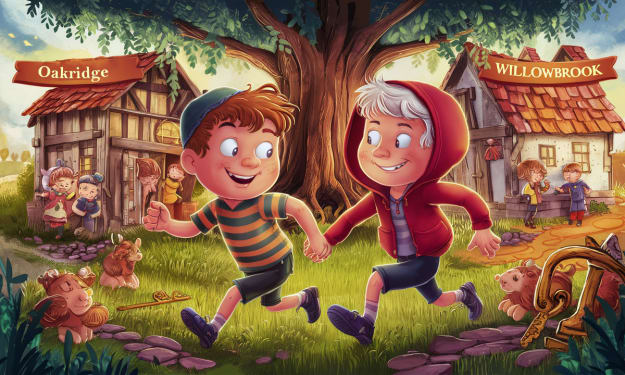The Role of Gamification in Education App Development
Discover how gamification transforms education apps in 2023. Explore benefits & Android app development in e-learning.

In the ever-evolving landscape of education, traditional teaching methods are gradually giving way to innovative solutions that harness the power of technology. One such innovation that has gained significant traction in recent years is gamification in education app development.
By incorporating game elements into e-Learning app development, educators are discovering new ways to engage students and enhance the learning experience.
In this blog, we'll explore the concept of gamification in education app development, its benefits, and how it's revolutionizing mobile app development, particularly in the realm of Android app development.
Understanding Gamification in Education App Development:
Gamification is the process of incorporating game elements—such as competition, prizes, and challenges—into situations that are not typically considered games, such as education. By incorporating elements of game design into educational app development, gamification attempts to increase learning's interactivity, fun, and effectiveness.
Why Gamify Education Apps?
1. Increased Engagement:
One of the most significant advantages of gamification in education is its ability to captivate and hold students' attention. Games inherently tap into our competitive nature, motivating learners to actively participate.
2. Improved Retention:
Games frequently use a systematic, repetitive presentation of information to help pupils recall and comprehend difficult ideas.
3. Enhanced Problem-Solving Skills:
As students must overcome obstacles to advance in the game, gamified education apps promote critical thinking and problem-solving.
4. Instant Feedback:
Real-time feedback made possible by gamification enables students to monitor their progress and spot areas for growth.
5. Motivation and Reward:
Rewards, such as points, badges, or virtual currency, serve as positive reinforcement and motivate students to achieve goals.
Key Gamification Elements in Education App Development:
To effectively gamify an education app, developers need to incorporate key elements from game design:
1. Points and Scoring:
Award points for completing tasks or answering questions correctly. Leaderboards can display the top performers, fostering healthy competition.
2. Badges and Achievements:
Implement badges or achievements for reaching milestones, completing levels, or mastering specific skills. These serve as visible symbols of progress.
3. Progression and Unlockable Content:
Create learning modules or levels that students can advance through. This fosters a feeling of accomplishment and eagerness.
4. Storytelling:
Develop a narrative or storyline within the app to engage students emotionally and keep them invested in the learning journey.
5. Feedback and Rewards:
Give students timely feedback on their performance on tests or completed tasks, and acknowledge them with virtual goods, certificates, or in-app money.
6. Competition and Collaboration:
Include features that allow students to compete with peers or collaborate on tasks, promoting social interaction and teamwork.
Gamification in e-Learning App Development:
Due of gamification's capacity to serve a wide spectrum of learners, from K–12 students to corporate employees seeking skill development, the e-Learning industry has experienced a spike in its usage.
It's critical to achieve a balance between instruction and fun while developing e-Learning apps. The information should be instructive, in line with curriculum goals, and offer an enjoyable, immersive experience.
Benefits of Gamification in e-Learning Apps:
1. Customized Learning Paths:
Apps using gamification in e-learning can give challenges and content that are personalised to each student's speed and learning preferences.
2. Better Engagement in Remote Learning:
By keeping students engaged and motivated, gamification helps lessen the difficulties of remote learning.
3. Measurable Progress:
Data analytics in e-Learning apps can provide educators with insights into students' progress, helping tailor instruction to individual needs.
4. Continuous Learning:
Gamification encourages lifelong learning by making education an ongoing and enjoyable pursuit.
5. Skills Transfer:
Gamified e-Learning can facilitate the transfer of skills to real-world applications, making education more practical.
Gamification in Mobile App Development: The Android Advantage:
The Android platform offers a distinct benefit for creating educational mobile apps. Android is a great option for reaching a wide audience because it is open-source and widely used on a variety of devices.
Because Android is so adaptable, developers can use it to make immersive gamified experiences that take into account various screen sizes, resolutions, and hardware capabilities. This adaptability is especially useful when creating educational apps because it enables users to have a seamless experience on a variety of devices.
Moreover, the Google Play Store provides a vast marketplace for educational apps, allowing developers to reach a global audience easily. The Android ecosystem encourages innovation in education app development, offering tools and resources to create engaging and effective learning experiences.
Case Studies: Gamified Education Apps on Android:
1. Duolingo:
Duolingo is a language learning app that effectively uses gamification to engage users. It incorporates elements like points, streaks, and a competitive leaderboard to encourage regular practice and language acquisition.
2. Kahoot!:
The quiz and educational gaming platform Kahoot! is well-known. Using their smartphones, students can participate in interactive surveys, chats, and quizzes that educators have created. The competitive element makes learning in the classroom more exciting.
3. Quizlet:
Quizlet is a study aid that employs games, quizzes, and flashcards to aid with learning. It is renowned for its entertaining and participatory method of study and remembering.
Tips for Successful Gamified Education App Development:
If you're considering developing a gamified education app, here are some key tips to keep in mind:
1. Clearly Define Learning Objectives:
Ensure that the gamification elements align with your educational goals and curriculum.
2. User-Centered Design:
Prioritize user experience by making the app intuitive and easy to navigate.
3. Balanced Challenge:
Strike a balance between making the app challenging enough to engage users but not so difficult that it becomes frustrating.
4. Feedback Loop:
Provide immediate feedback to students to help them gauge their progress and encourage improvement.
5. Accessibility:
Ensure that the app is accessible to all learners, including those with disabilities.
6. Continuous Improvement:
Collect user feedback and data to continually refine and enhance the app.
Conclusion:
gamification in the creation of educational apps is changing how we interact with and learn from educational content. Integrating gamification aspects can result in increased student engagement, enhanced learning results, and a more fun educational experience whether you're creating an e-Learning software or a mobile app for Android smartphones.
As the educational technology landscape continues to evolve, the role of gamification in education app development is likely to become even more prominent, making it an exciting and promising field for developers and educators alike.
About the Creator
Tarun Nagar
Tarun Nagar is the Founder & CEO of Dev Technosys UAE, a global ranking Website Development Company, and Mobile App Development Company.






Comments
There are no comments for this story
Be the first to respond and start the conversation.